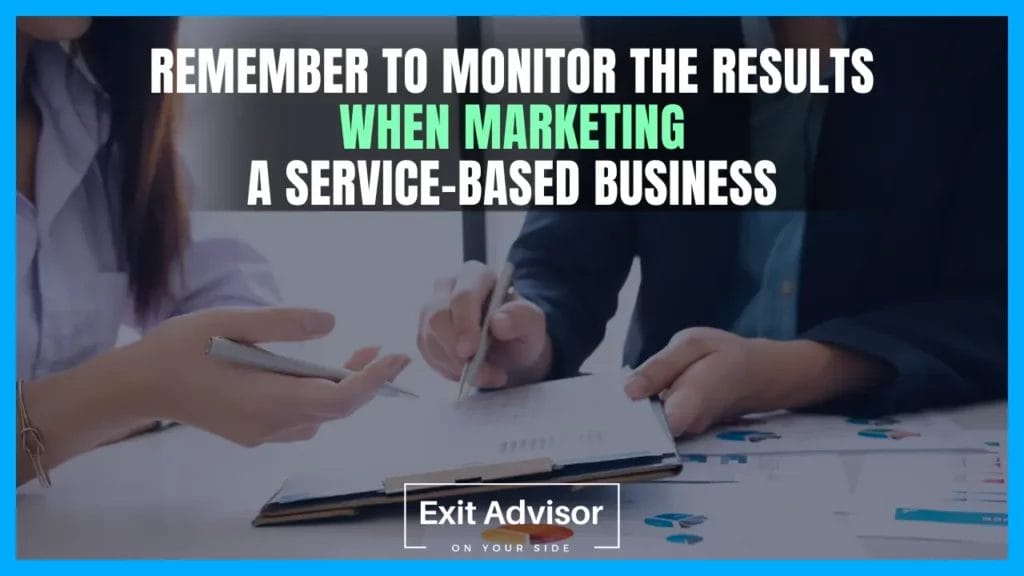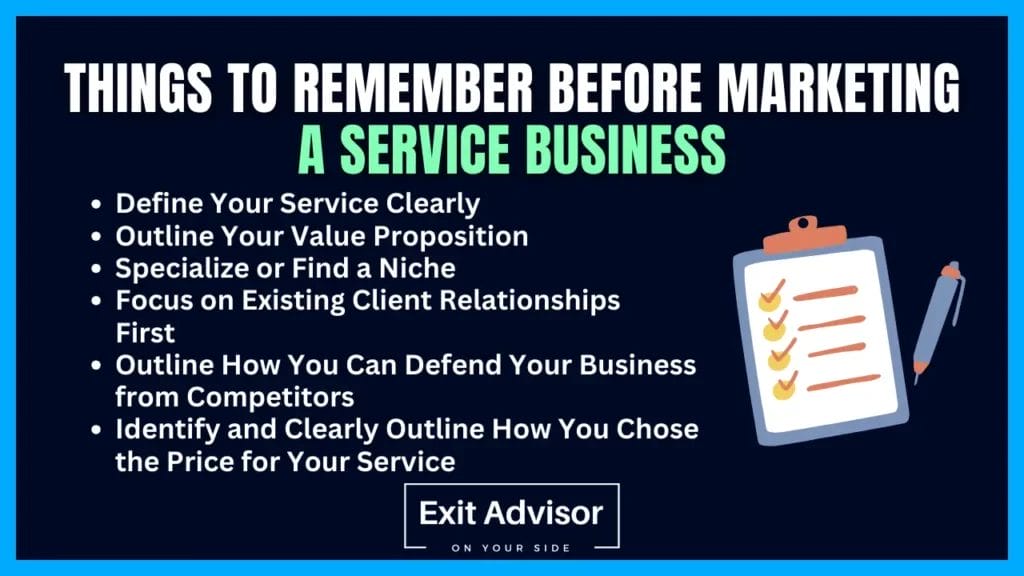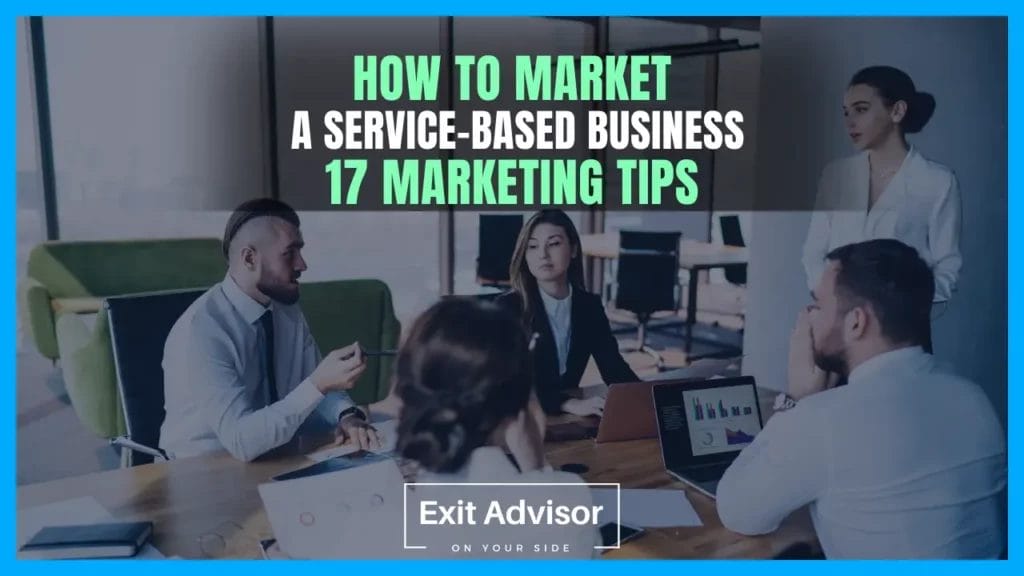In today's competitive business landscape, effective marketing strategies are the lifeblood of any service-based business. The process of marketing a service-based business is more than just advertising; it's about building relationships, understanding your audience, and delivering an unparalleled experience that turns clients into long-term patrons.
Understanding the target market forms the cornerstone of any successful marketing strategy. This involves a demographic analysis and a deep dive into their preferences, needs, and pain points. Once armed with this knowledge, you can tailor your offerings to match these needs, creating a unique value proposition that sets you apart from the competition.
This comprehensive guide will deeply dive into listing and explaining the 17 best tips for marketing a small business.
We will highlight the nuances of building meaningful relationships with your clients, leveraging your unique value proposition, and crafting strategies to help your business tower over your competition. Be it digital marketing techniques or traditional promotional efforts, we've got it all covered.
So, buckle up and prepare for an enlightening journey to rocket your service-based business to unprecedented heights.
| Key Takeaways |
|---|
| Service-based business marketing requires a clear definition of the services offered, with detailed features, benefits, and delivery processes. |
| Your unique value proposition should be clearly stated, explaining how your service solves customer problems and why you stand out from competitors. |
| Finding a niche or specializing can help differentiate your service and fulfill unmet market needs. |
| Existing client relationships should be a top priority, as they can drive growth in client retention and attract new clients through positive referrals. |
| Identifying and leveraging competitive advantages can help defend your business from competitors. |
| Monitoring key performance indicators like CTR and conversion rate is critical for evaluating the effectiveness of your marketing efforts. |
The Basics of Service Business Marketing

Starting with the basics, the cardinal rule to market your service business is to develop a thorough understanding of your target audience and build trust between them. This is more than just knowing the demographics of your potential clients; it's about delving into their desires, needs, and struggles. Remember, better marketing will result in a better business selling in profit.
By comprehending what drives your audience, what they value, and what issues they may face, you can create a highly tailored service to suit their requirements.
This process demands comprehensive market research, encompassing both qualitative and quantitative methods. Surveys, interviews, and focus groups can provide valuable insights into existing customer preferences and buying behaviors. Data analysis tools can also help you identify patterns and trends, offering a broader view of your audience segment.
You can communicate more effectively with your potential clients by channeling these insights into your marketing strategy. This understanding allows you to use the right language, design, and platforms that resonate with your audience.
Consequently, this leads to improved engagement, stronger relationships, a solid customer base, and a competitive edge in the market. Understanding your target audience is not just the first step but a continuous process in your marketing journey. Effective marketing can also help in selling a business to a competitor.
Why You Should Market Your Service-Based Business

Marketing your service-based business goes beyond merely promoting your services. Suppose, your business is failing or losing money, creating awareness, nurturing relationships, and cultivating trust among potential clients will bring more profit and revenue. Imagine being a fitness coach who provides personalized training programs. How would potential clients learn about your unique approach, expertise, or success stories without marketing?
The answer lies in effective marketing. You are not just advertising your services by sharing client testimonials, showcasing your fitness journey, or offering free webinars on health and fitness. You demonstrate your knowledge, credibility, and commitment to your client's health goals. This marketing cultivates trust and builds a sense of community among your clients, intensifying their loyalty to your brand.
Similarly, consider a freelance graphic designer. One could share time-lapse videos of their design process, offer free templates, or share blogs about the latest design trends. This illustrates your skills and provides value to your audience, making them more likely to turn to you when they need professional design services.
In essence, marketing your service-based business allows you to showcase your brand's unique personality, empathize with your clients, and establish yourself as an authority in your field. It's a powerful tool that can catapult your business into the limelight and keep it there.
Now, let's delve into the effective ways to market a business. You'll learn the importance of using social media platforms, positive customer reviews, service marketing strategies, influence marketing tips, and more.
17 Steps How to Market a Service-Based Business
1. Define Brand Identity Clearly
Defining your brand identity is more than creating a logo or choosing a color palette. It's about crafting a comprehensive image that resonates with your audience and sets you apart from the competition. Your brand identity represents your company's values, mission, and culture. It's what makes your service unique and meaningful to your target market.
For instance, if you're a digital marketing agency, your brand identity could be built around delivering personalized, data-driven strategies that drive growth for your clients' businesses.
2. Build Community Connection
Building strong community connections can elevate your brand's presence and credibility. This involves participating in local events, sponsoring local teams, or collaborating with other local businesses.
Doing so promotes your service and contributes to the community, fostering goodwill and trust among your potential clients.
A restaurant, for example, could host a local food festival, fostering a sense of community and establishing itself as an active participant in local initiatives.
3. Localize with Cards, Materials
Localizing your marketing materials is a powerful way to resonate with your local audience. This could involve featuring local landmarks on your business cards, using local dialects in your marketing copy, or tailoring your content to address local issues or events. This shows your understanding of the local community and makes your service more relatable and appealing to your local audience.
A local gym, for instance, could create workout plans tailored to local activities and lifestyles, demonstrating its understanding and commitment to the local community.
4. Prioritize Consistent Communication Always
Consistent communication is key to nurturing relationships with your clients. It involves regularly updating your clients about new services, sharing useful content, or even checking in with them. Regular, meaningful communication keeps your brand at the top of your client's minds, strengthening your relationship and brand loyalty.
For a personal coaching service, this could involve sending regular newsletters with personal development tips or maintaining an active social media presence where you share motivational quotes and success stories.
5. Partner with Media, Influencers
Partnering with media outlets or influencer marketing campaigns can significantly boost your brand's visibility and credibility. Featuring your services in a local newspaper, appearing on a popular podcast, or collaborating with a well-known influencer in your field can expose your business to a wider audience.
Furthermore, being endorsed by a trusted source enhances your credibility, making potential clients more likely to consider your service. A tutoring service, for instance, could collaborate with a popular education blogger to create a series of learning resources, reaching a wider audience and establishing its authority in the field.
6. Value Over Quantity, Price
Making value the focal point of your service over quantity or price is a cut-above strategy that works for service-based businesses. This strategy involves focusing on the unique benefits that your service provides rather than simply competing on price or quantity.
By demonstrating the exceptional value of your service, you can justify a higher price point and attract clients who are interested in quality over affordability.
For instance, a high-end hair salon could emphasize the expertise of its stylists, the exclusivity of its products, or the ambiance of its space to highlight the value of its services.
7. Customer Service: Top Priority
Prioritizing customer service is crucial to the success of a service-based business. Exceptional customer service entails listening to your customers, addressing their concerns promptly, and exceeding their expectations whenever possible.
Doing so ensures customer satisfaction and fosters loyalty, encouraging your customers to return and recommend your service to others.
For example, a home cleaning service could offer flexible scheduling, respond quickly to feedback, or surprise loyal customers with complimentary services to demonstrate its commitment to outstanding customer service.
8. Optimize Website for Clarity
Optimizing your website for clarity ensures visitors can easily understand your service and how it can benefit them. This involves creating clear, concise, compelling copy, using intuitive navigation, and incorporating visual aids like images or videos to illustrate your service.
For instance, a business owner of a wedding planning service could include a step-by-step guide of their process, a gallery of past events, and customer testimonials to convey the value of their service.
9. Communicate Unique Selling Proposition Clearly
Communicating your unique selling proposition (USP) differentiates your service. Your USP makes your service special, so clients should choose your service over others. Articulating your USP in your marketing materials gives potential clients a compelling reason to choose you.
For instance, a fitness coach could highlight their holistic approach to wellness, combining exercise, nutrition, and lifestyle coaching as their USP.
You can pitch your prospective clients through email marketing, content marketing, and online advertising. A good service marketing strategy involves positive communication, so focus on it.
10. Tailor Services to Individual Needs
Tailoring your services to individual needs underlines a personalized approach that potential clients appreciate. This involves understanding each client's unique needs, preferences, and goals and customizing your service accordingly. Doing so provides a more effective service and shows your clients you genuinely care about their success.
For example, a life coach could offer personalized coaching programs based on each client's life goals, challenges, and strengths.
11. Ensure Customer Satisfaction, Loyalty
Ensuring customer satisfaction and loyalty is crucial for the growth and sustainability of a service-based business. Customers are more likely to become repeat customers and recommend your service to others when satisfied. This can be achieved by delivering high-quality service, addressing customer complaints promptly, and offering loyalty programs or incentives.
For example, a restaurant could offer a loyalty card that provides a free meal after a certain number of purchases to encourage repeat visits.
12. Use Social Proof Effectively
Social proof, such as testimonials, reviews, and case studies, can be a powerful tool for attracting new clients. It boosts your credibility and gives potential clients confidence in your service. For instance, a digital marketing agency could showcase testimonials from satisfied clients on its website to demonstrate the effectiveness of its services.
13. Provide Exceptional Customer Service
Exceptional customer service can significantly differentiate your business in a competitive market. It involves being responsive, showing empathy, and going above and beyond to meet customer needs.
A business that provides exceptional customer service, like a hotel offering personalized concierge services, can create memorable experiences that lead to repeat business and positive word-of-mouth.
14. Simplify Booking Processes Online
A simple and intuitive online booking process can enhance the customer experience and increase conversion rates. This can be achieved by reducing the steps needed to make a booking, offering multiple payment options, and providing immediate booking confirmation.
For example, a spa could use an online booking system that allows customers to choose their preferred treatment, therapist, and appointment time within a few clicks.
15. Strategically Create and Share Content
Creating and sharing content can educate your audience, showcase your expertise, and attract potential clients. This could involve creating blog posts, videos, or social media posts that provide valuable information about your service.
For instance, a yoga studio could share posts about the benefits of yoga, tips for beginners and class updates to engage its audience and attract new students.
16. Incentivize with Welcome Deals and Referral
Offering welcome deals and referral incentives can attract new clients and encourage existing clients to refer others. These could be discounts, free trials, or bonus services. For example, a hair salon could offer a discount on the first visit or a free treatment for every successful referral.
17. Transform Service into a Marketable Product
Transforming your service into a marketable product can make communicating its value easier, pricing it appropriately, and scaling your business. This could involve packaging your service into defined offerings, each with a clear scope, deliverables, and price.
For instance, a graphic design agency could offer separate packages of logo design, website design, and social media design, making it clear what clients will get for their investment.
Remember to Monitor the Results When Marketing a Service-Based Business

Remember to Monitor the Results
Monitoring the results of your marketing channels is crucial in a service-based business. It allows you to understand what's working, what's not, and where improvements can be made. Key performance indicators like click-through rate (CTR) and conversion rate give you a quantitative measure of your marketing effectiveness in online presence.
Click-Through Rate (CTR)
Click-through rate, or CTR, is a critical metric that measures the number of clicks advertisers receive on their ads per number of impressions.
A high CTR indicates that your marketing messages resonate with your audience and entice them to learn more. By monitoring and optimizing for CTR, you can ensure your marketing materials reach and engage your target audience.
Conversion Rate
Conversion rate is another crucial metric that tells you the percentage of your website visitors who are completing a desired goal (a conversion) out of the total number of visitors. A high conversion rate indicates successful marketing and web design: People want what you're offering and can easily get it!
By tracking this metric, you can assess the effectiveness of your call-to-action and the overall user experience on your website. This information is valuable for fine-tuning your services, improving customer satisfaction, and increasing return on investment.
Things to Remember Before Marketing a Service Business

Define Your Service Clearly
Defining your service involves articulating precisely what you offer and how it can benefit the customer. This could involve detailing the features of your service, the benefits it delivers, and the process by which it is delivered.
For instance, a landscaping service could explain the variety of services they offer, such as lawn care, garden design, and tree maintenance, along with their benefits, such as enhancing a property's aesthetic appeal and value.
Outline Your Value Proposition
Your value proposition clearly explains how your service solves customers' problems, delivers specific benefits, and why customers should choose you over your competitors. For instance, a tutoring service could highlight its value proposition by stating that it specializes in personalized learning plans that help students improve their grades and build confidence in their academic abilities.
Specialize or Find a Niche
Specializing or finding a niche involves focusing your service offering on a specific market segment or area of expertise. This can help you differentiate your service, cater to unmet needs, and become a go-to provider in your chosen field. For example, a cleaning business could specialize in eco-friendly cleaning services, catering to a growing market of environmentally conscious consumers.
Focus on Existing Client Relationships First
Maintaining strong relationships with existing clients can contribute significantly to your business's growth and sustainability. This involves regularly communicating with clients, understanding their evolving needs, and providing consistent, high-quality service. Doing so can increase client retention, repeat business, and attract new clients through positive word-of-mouth.
Outline How You Can Defend Your Business from Competitors
Defending your business from competitors involves identifying and leveraging your competitive advantages – the unique qualities that set your service apart. This could be your expertise, unique service features, superior customer service, or competitive pricing.
By clearly outlining these advantages, you can position your service more attractively in the market and differentiate it from competitors.
Identify and Clearly Outline How You Chose the Price for Your Service
Pricing is a crucial aspect of your service that can significantly influence customer perceptions and purchase decisions. Your pricing strategy should be based on various factors, including the service's cost, market rates, perceived value, and business goals.
For instance, a personal training service could be priced based on the trainer's expertise, the personalized nature of the training plans, and the health benefits and results clients can expect to achieve.
Conclusion
Marketing a service-based business requires a dynamic and calculated approach. It entails packaging your service into a marketable product, monitoring key performance indicators, and refining your service proposition based on feedback.
The crux of this process lies in understanding and communicating the unique value your service offers. Specializing in a niche area, nurturing client relationships, and competitively pricing your service are all strategies that can enhance your market position.
The success of your service marketing efforts ultimately hinges on how well you understand your market, communicate your value, and adapt to evolving customer needs.










